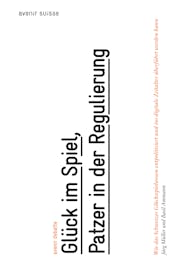In Switzerland, gambling proceeds to the tune of around CHF 1 billion a year flow into coffers defined by politicians. Contrary to what people generally understand, some casinos contribute to the funding of their local cantons and municipalities. Added to this, over the years the cantons have seen a veritable cash distribution industry grow up around the two lottery schemes, Swisslos and Loterie Romandie. In some cases the projects into which the proceeds of gambling are funneled are controversial.
Inefficient and Rife with Conflicts of Interest
In addition to being politicized, the way gambling is organized is inefficient. The new study from Avenir Suisse estimates the administrative costs alone of the 80 or so cantonal lottery funds at CHF 16 to 22 million a year, and the total friction costs of the current system come to considerably more. More serious than these costs, meanwhile, are the conflicts of interest that come with the intertwining of different state roles.
According to the study’s authors, Jürg Müller and Basil Ammann, this weakens the hand of the regulator, making it more difficult to deal appropriately with the problem of gambling addiction. It also prevents any fundamental reform of gambling that would be needed in the wake of digitalization. Recently, in addition to the “traditional” online casinos, the regulators have been increasingly challenged by blockchain-based gambling set-ups.
The Swiss system, which has evolved historically, is particularly affected by this technological change. While new gambling legislation entered into force in 2019, it failed to solved the fundamental problems around the pursuit. The need for legislative action is likely to become more urgent again soon.
Direct Redistribution to Members of the Public
Against this backdrop, Avenir Suisse has drawn up a three-step reform agenda designed to take the Swiss gambling sector into the 21st century.
- The first step should be for the state to relinquish interests in gambling providers and depoliticize the distribution of the proceeds of gambling. One of the measures proposed in the study is to directly redistribute the proceeds – on the basis of 2019 data this would amount to around CHF 115 per capita – back to the population. As well as being fairer and more efficient, this mode of distribution would also resolve the delicate, primarily cantonal conflicts of interest in the Swiss gambling sector.
- The second step would be to untangle the web of complex institutions. Today, thanks to digitalization, there are two increasingly overlapping gambling spheres: the federal government and the cantons. This leads to duplication and unnecessary conflicts. The idea would be to merge the supervisory bodies and thus strengthen the hand of the regulator.
- This institutional streamlining would pave the way for the third step: reworking the regulations on gambling. A modular approach would make sense, with a basic license plus licenses for forms of gambling with specific regulation. This way the “analogue first” principle that currently applies could be set aside in favor of technology- and competition-neutral regulation.
It’s clear that any lasting reform of the Swiss gambling sector cannot start by simply addressing the effects of digitalization. First the problematic state roles have to be discarded to resolve the conflicts of interest that exist. Only then can an institutional framework be created that will allow the regulators to keep pace with technological developments going forward.






